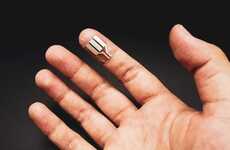
The 'ECO-Urinal' Generates Electricity Using Your Urine
Alexander Lam — August 7, 2013 — Art & Design
References: liteonaward & yankodesign
The 'ECO-Urinal' works to generate electricity with the help of your urine. Using the urea found in pee, the urinals can collect energy. The stored electricity can then be used to light washrooms, power sensors or even supply energy to the power grid. As a result, the energy expended when urinating can be recycled and used as a clean power source.
Energy is generated by using urine to create an electric current in fuel cells. Oxygen and water can be used to absorb electrons and create hydroxide ions. Since urea releases electrons when it comes in contact with hydroxide ions, the urinals are able to generate electricity.
Designers Liu Yi, Yue-Bo Shen and Fang-Tian Ying from Zhejiang University in China designed the concept urinal for the 2013 Lite-On Awards.
Energy is generated by using urine to create an electric current in fuel cells. Oxygen and water can be used to absorb electrons and create hydroxide ions. Since urea releases electrons when it comes in contact with hydroxide ions, the urinals are able to generate electricity.
Designers Liu Yi, Yue-Bo Shen and Fang-Tian Ying from Zhejiang University in China designed the concept urinal for the 2013 Lite-On Awards.
Trend Themes
1. Urinal Energy Generation - The concept of generating electricity from urine opens up opportunities for sustainable power sources in various applications.
2. Fuel Cell Technology - The use of fuel cells to convert chemical energy from urine into electrical energy presents disruptive innovation potential in renewable energy systems.
3. Energy Harvesting From Waste - The idea of harnessing energy from waste products like urine demonstrates a shift towards utilizing unconventional sources for power generation.
Industry Implications
1. Renewable Energy - The renewable energy sector can explore incorporating urinal energy generation as a viable source of clean power.
2. Sustainable Infrastructure - Integrating fuel cell technology into bathroom systems can contribute to sustainable infrastructure development with self-sufficient power capabilities.
3. Waste Management - The waste management industry can leverage energy harvesting from waste to enhance resource efficiency and promote circular economy principles.
3.9
Score
Popularity
Activity
Freshness























